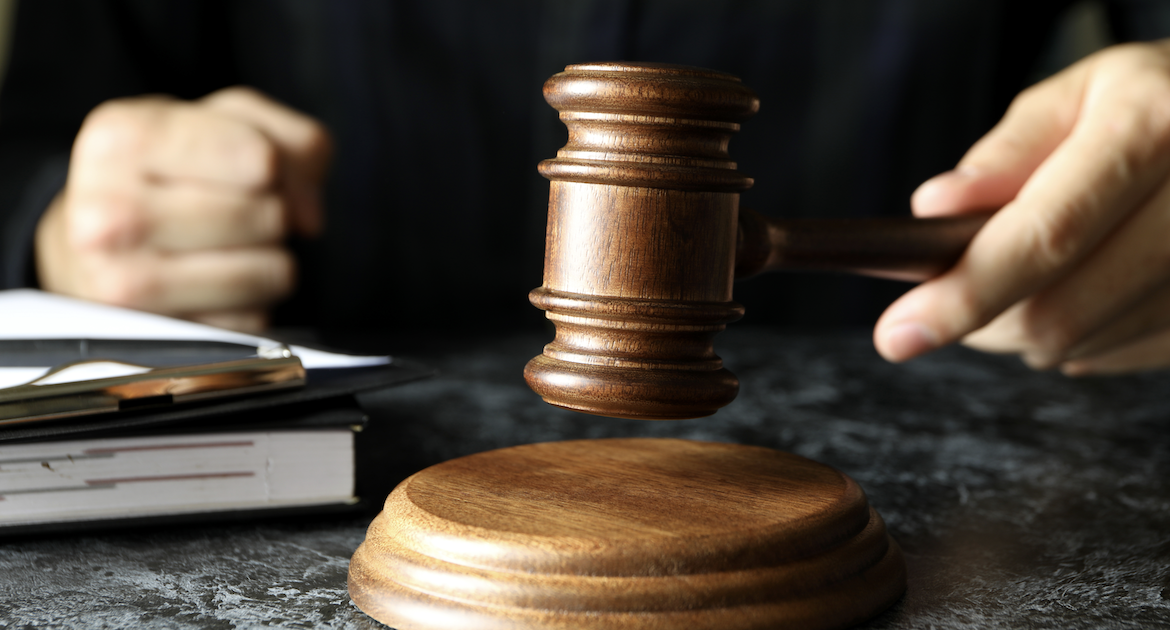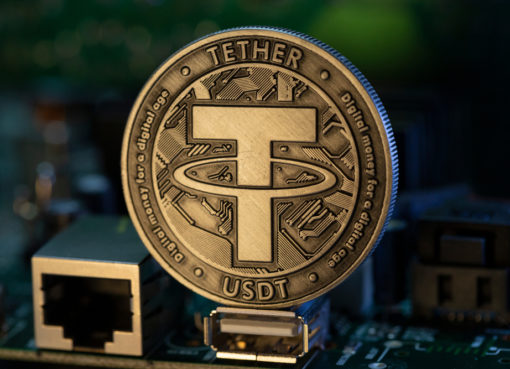Courtrooms are often slow in adopting new technology. Blockchain has taken the business world by storm over the past few years, but when it comes to the tradition-bound legal world, its use — despite years of talk about the technology’s potential — has been lacking in momentum.
The Covid-19 pandemic, however, might play a role in pushing ahead the blockchain uses in the courtroom, to facilitate online hearings as well as evidence collection and presentation.
A Chinese court in Guangzhou, the capital city of South China’s Guangdong province, recently started adopting a new blockchain system in a lending dispute case so the parties can submit evidence and do cross-examination online.
In this case, the “blockchain electronic cross-examination system” allows each side to upload its evidence online. The opposing party, under the judge’s supervision, can cross-examine the submitted evidence by asking questions and providing answers. The system records on the blockchain all the evidence submitted as well as the questions and statements from the cross-examination.
The reason for adopting the blockchain cross-examination system, in this specific case, was because travel restrictions from the Covid-19 pandemic would have delayed the trial if evidence review and cross-examination had to be done in person. The judge also decided that it would take too much time to submit evidence through the mail.
Peter Bullock, a partner in the Hong Kong office of law firm King & Wood Mallesons, told Forkast.News in an interview that one of the very few benefits from this dreadful Covid pandemic is that courtrooms in some places have been able to have some hearings held online. “We’ve been able to have some witnesses who will be able to give their testimony from afar using video technology. It has taken this terrible event of the last 18 months to move the court from the 1970s- or 1980s-procedures to using video technology.”
“Pushing them further forward to use blockchain is going to take a lot of far-sighted administrators within the court system,” Bullock added. “It will be patchy… But I do see it happening, particularly in record-keeping.”
Early adoption in China
As in many things blockchain, China has come early to applying the technology to the legal game. Blockchain developments in China accelerated after 2019, when President Xi Jinping declared blockchain a national priority and called for more research, investment and regulation of the technology. In March this year, for the first time, the words blockchain and digital currency were officially written into the country’s blueprint for its near future.
China’s 14th five-year plan, which covers 2021 to 2025, has a whole chapter on digital transformation in every sector of Chinese society, ranging from real industries to governmental administration.
As a result, blockchain development in China’s legal world seems to be picking up more steam than courtrooms and law offices elsewhere. As early as September 2018, China’s Supreme People’s Court issued a regulation to recognize blockchain technology as a legitimate means to collect, fix and tamper-proof data. In August this year, the Supreme People’s Court’s latest Regulation of Online Litigation issued additional regulations for determining the authenticity and validity of blockchain evidence.
Many cities in China have seen courts using blockchain to facilitate proceedings. In addition to Guangzhou, courts in the provinces of Jilin and Shandong and the cities of Chengdu, Quanzhou and Taiyuan as well as three internet courts in Beijing, Guangzhou and Hangzhou have all begun using blockchain to preserve evidence.
Meanwhile, Hangzhou Internet Court, begun in 2017 to hear internet-related cases, has also started a “Kunpeng” campaign where law enforcement officers would syndicate execution results onto blockchain, the court said in a recent social media post.
“There is much less of a rulebook in China in terms of the courts,” Bullock said. “The system is a civil law system. They’re not hidebound by precedents. And if you have a judge who is far-sighted, he or she can organize their courts as they see fit.”
Record keeping
Blockchain technology holds many potential benefits for the legal world. “There is, of course, the immutability. So it’s not easily changeable, but that also can be a bad point sometimes,” Mark Shope, an assistant professor who specializes in technology and the law at Taiwan’s prestigious National Yang Ming Chiao Tung University School of Law, told Forkast.News in an interview.
Shope said that blockchain could bring more transparency and the ability to keep records in a safe, encrypted method.
In the U.S., electronic discovery, electronic filing and the idea of trading documents electronically have been around for a while, according to Shope. “It seems to be creating efficiencies in that the parties can easily upload the documents, easily access the documents — I’m assuming — through public and private key encryption and all of that sort of safety mechanisms. So I think that there’s promise there in party-to-party kind of use of the blockchain.”
Bullock shared similar ideas.“Lawyers love to keep records,” he said. “How many of those episodes of lawyer shows have something gone wrong at court because somebody hasn’t turned up, or the records aren’t straight, or something isn’t believable about the records.”
“It all might sound very boring and not going to set the world on fire. But the keeping of records is much more susceptible to being correct if you use a blockchain where essentially you’re not relying on people’s memory,” Bullock added. “If you have everything on the blockchain, then you know that everything that went on the blockchain stays on the blockchain.”
In many countries, legal precedents are essential, and that’s where blockchain technology can come in handy.
“In common law jurisdictions, when there is a case which is cited, then you’ve got to make sure that all of the other mentions of that case — which can be over centuries, frankly, particularly in English courts — are updated so that you have a cross-reference,” Bullock said.
“Now, that is incredibly difficult, and it’s always been done by an updater service, which essentially is a manual process, so that whenever anybody cites a case, it is supposed to be noted up on the earlier case to say, ‘oh, see this citation?’ Now, it relies on a lot of legwork and also memory work,” Bullock added.
However, if the cases and citations are logged on the blockchain, “then the whole thing is cross-referenced immutably.”
“Although there would be a huge effort to get it onto the system from the start, once you run it forwards, then that can be a great benefit — particularly in the U.S., where they may take precedent to a sort of art form, which is just not seen anywhere else,” Bullock said.
Daniel Payne, a leader of fintech and blockchain practices at U.S. law firm Murphy & McGonigle in Virginia, told Forkast.News that tokenizing government records, which are often managed in analog systems built decades ago, can also improve the efficiency and transparency of many legal transactions such as real estate transfers and managing vital records.
“The records can be accessed without government intermediaries and can be verified by the public without having to go to the courthouse or city hall,” Payne said in an emailed response.
Chain of custody
Blockchain can help when it comes to ensuring data integrity and keep a “chain of custody” on track.
Chain of custody — the documentation or paper trail that records the chronological sequence of how something has been handled, stored, transferred and transported — is an important legal requirement for a piece of evidence to be admissible in court. If chain of custody is broken or cannot be shown, attorneys can claim the evidence could have gotten tainted or tampered with, and render the evidence inadmissible.
Henry Lin, Taipei-based crypto and corporate lawyer at Lin and Partners, who also serves as chairman of Bitcoin and Crypto Currency Development Association in Taiwan, said that Taiwan has rolled out a blockchain platform to tackle this issue.
Taiwan police is now able to upload electronic evidence onto blockchain through a platform that went live last year, with support from Taiwan’s Ministry of Justice, according to Lin. “This can ensure the legitimacy of the evidence and make sure it’s not tampered along the process of transition before it is presented at the court,” he said.
“Blockchain technology is designed to create an immutable, verifiable, and transparent record of ownership,” Payne said. “These attributes are exactly what courts desire with chain of custody systems.”
One major challenge, however, would be how the technology could facilitate the migration from evidence that could possibly be in the real world to evidence that’s in the digital world.
“Let’s say some of the evidence is a bloodstain,” Shope said. “We can digitize that DNA evidence and maybe place that on the blockchain. But you can’t physically put the blood on the blockchain.”
Payne shares a similar view. Digital evidence would be an obvious starting place to introduce blockchain for chain of custody, he said, but most of the evidence that have chain-of-custody issues is physical. “There would need to be an analog blockchain system that track physical evidence, but the blockchain technology would still be an improvement.”
Identity proof
Another prominent blockchain use in the legal sector is a certification system for attorneys.
Taiwan, for example, has rolled out a blockchain platform that logs attorneys’ licenses and certificates for the public to review.
Lin said that given the immutability attribute of blockchain, the platform can help prospective clients identify if the legal professional they want to hire really holds an active license. “This can help solve issues of ‘fake lawyers’ in scams,” he said.
Shope said that for any sort of license, blockchain can add value to it through authentication.
“There’s the potential of [a license] being exploited and stolen. There’s a risk of being used in a malicious way,” Shope said. “Identity solution on the blockchain is a whole other kind of idea.”



